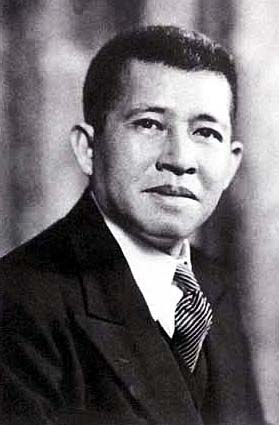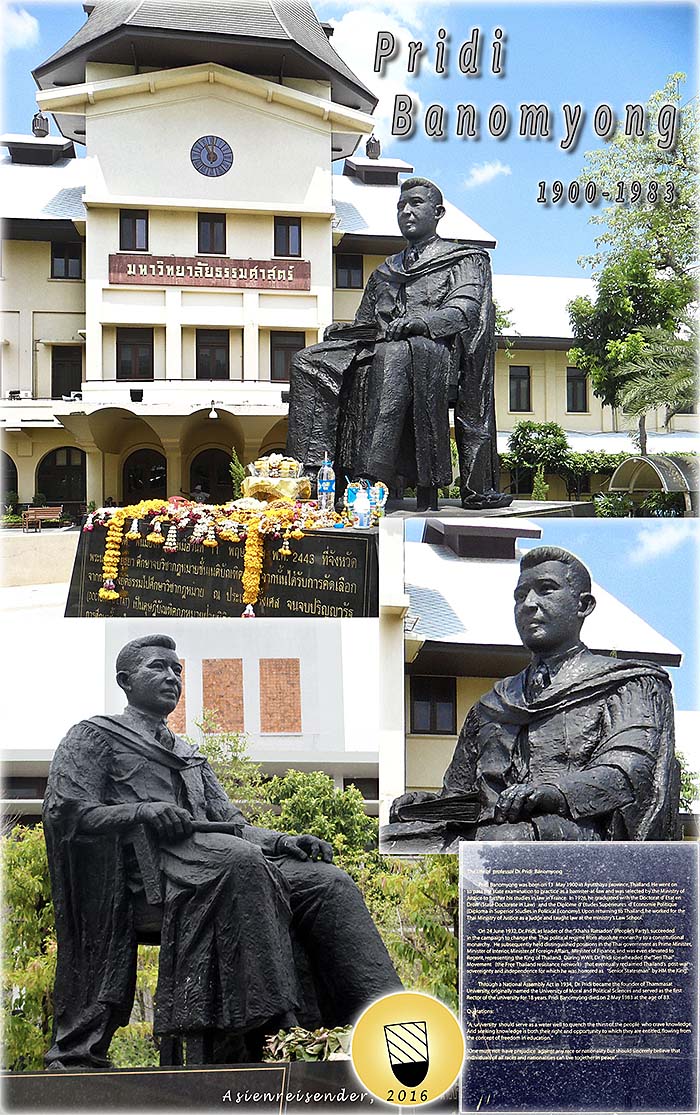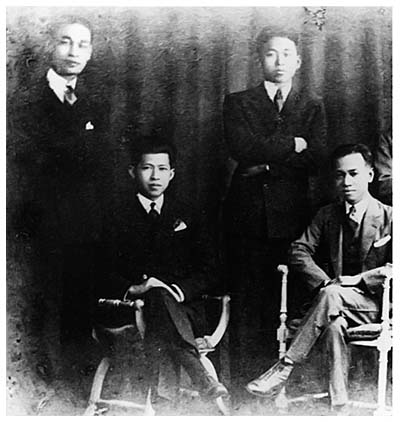A Thai Progressive
Pridi Banomyong was born 1900 in Ayutthaya into a family of Siamese nobility. He played an important role in Thai politics in the mid 20th century. After a career in the Thai judiciary he took a key role in the Siamese Revolution of 1932 and the abolishment of absolute monarchy in the country. Pridi worked out the first constitution for Siam which was adapted by the new government in 1932.

The photo has been shot in January 1945. Source: en.wikipedia.org, common free, slightly altered by Asienreisender
Pridi Banomyong's political ideas based on western liberalism and the strong socialist movements and ideas of the time in Europe, with who he came in contact in his young years in France, where he studied for a few years at the Sorbonne. Additionally he favoured buddhist ideals of a justice society, in which everybody could live free of material worries.
In 1933, Pridi suggested an economic plan which included the nationalization of all agrarian acreage and the means of production. The goal was to develop the industrialization of Siam and to eliminate (particularly rural) poverty. That triggered such an outrage in conservative and reactionary circles, that there was put an enormous pressure on Pridi. King Prajadhipok (Rama VII) compared him with Stalin. He got a government offer of a stipendia for France, for a part of the Siamese elities wanted to get rid of him, and in the political short-term circumstances of the time there was no alternative for him but to go.
Just two months later there was another coup in Siam, and Pridi could come back. However, there was a commission of inquiry put on him for communist ambitions. He got acquitted and then became even domestic minister in the new government. Quite an up-and-down in Pridi's career, which would continue over the next years.

The founding of Thammasat University was one of the projects of the revolutionary government. It was the second university in Thailand, after Chulalongkorn University. It was founded in the spirit of a much more egalitarian society, in which the nobility wouldn't enjoy priviliges merely by birth, while common people weren't able to gain education.
The founding of Thammasat University was following the idea to educate a new kind of academics who were able and willing to serve in a democratic manner of civil responsibility. Pridi was university rector from 1934 till 1949.
Images and photocomposition by Asienreisender, 2012, 2015, 2016
In 1936, Pridi became foreign minister and concluded contracts which annihilated the 'unequal contracts' of the 19th century, in which European powers gained exterritorial rights in Thailand, including impunity for their subjects. With that, Thailand gained the full souvereignity as an independend state. His politics followed the line of strict neutrality, rejecting also Japanese interventions for special rights in Thailand.
In 1938 Pridi became ministry of finances. From this time on he grew more and more to a critic and rival of Plaek Phibunsongkhram, field marshal and now primeminister, who led an authoritarian style of government. Particularly the militarization and enforcement of the army was point of critics. However, the spirit of the time favoured nationalism, and Pridi became more and more an outsider and a lonely voice.
After the Japanese attack on Thailand in December 1941 and the agreement of the Thai government to cooperate with the Japanese usupers, Pridi refused to support that politics as minister.
Soon later he was dismissed from the cabinet and therefore nominated as one of three members of the regency council of underage king Ananda Mahidol (Rama VIII), who lived with the whole royal family abroad, at this time in Switzerland. In this position he rejected the declaration of war against the USA as well as the Thai ambassador in Washington DC did, who refused to transfer the declaration of war. So, interesting thing, there has formally not been an official state of war between Thailand and the USA. Nevertheless, the Thai state chief Praek Phibunsongkhram claimed the state of war.

As students in Paris. From left to right: Khuang Aphaiwong (later prime minister), Pridi Banomyong, Thaep Aphaiwong, Luang Wichit Wathakan. The image was shot in Paris, 1927
Banomyong now initiated the underground resistance organization Seri Thai, movement for a free Thailand, which organized sabotage acts and fought partially openly with paramilitary units against the Japanese, who were seen as occupants, and, who behaved like occupants. No doubt, in case of a Japanese victory in World War II, Thailand would have been degraded to a mere vassal state of imperial Japan. Pribi's office as regency council was practically the headquarter of the organized resistance. After the end of Phibunsongkhram's primeministership, the new chief of the state, Khuang Aphaiwong, silently agreed with the resistance activities. After the Japanese surrender on August 15th, 1945, Pridi revoked the contract with Japan and the war declaration on Britain.
After the war, Pridi was highly honoured and gained some high decorations for his deeds in wartime. He served as an advisor of the next two Thai governments. In March 1946 he became himself primeminister and drafted a new constitution, which was, together with that of 1973, the most progressive and democratic constitution Thailand ever had.
After the dead of king Mahidol, rumours blamed Pridi of being guilty for an alleged assassination of the king. In August 1946 he retired from the trouble of being primeminister.
In September 1947, the 'Southeast Asian Liga', a connection of anti-colonial and anti-imperial organizations of Thailand, Burma, Vietnam, Malaya, Laos, Cambodia, the Philippines and Indonesia, was founded by Pridi and the Vietnamese Tran Van Giaus in Bangkok. The forces behind had fought against the Japanese occupation, which covered between 1942 and 1945 the whole of Southeast Asia, and they continued now to fight against the reestablishment of western colonialism in the world region. Since these forces were partially communist, like in former French Indochina, Pridi's political opponents, particularly the Thai army leadership, blamed him of supporting communism and planning to turn Thailand and Southeast Asia into a pro-Sowjet alliance.
In November 1947 it came to another of the many Thai military coups, which brought Pridi finally out of power. Pridi himself, who now faced persecution, maybe long-term imprisonment or an assassination, was brought out of Thailand with the help of British and American diplomats. Pridi enjoyed for a time asylum in Britain. However, after the Cold War intensified, and with it the anti-communist politics of the western governments, Pridi became over the time a persona non grata, while the ruling Thai military, for the reason of their strict anti-communist attitude, was favoured by the west. It became a possibility that Britain would hand Pridi over to the Thai government. Pridi gained a diplomatic passport and managed to move to China, where he spent the next 21 years. Pridi's family, who had remained in Thailand, came under severe pressure of the authoritarian government and faced arrest for times; his son Pal was jailed for five years.
Pridi Banomyong went 1970 to France, where he died in 1983. In 2000, Pridi Banomyong was nominated as one of the great personalities of the 20th century by the UNESCO. Politicians like Pridi Banomyong, social and democratic, don't exist anymore in our sinister times. It's strange, but the mid 20th century was a time with much more progressive people, politicians and ideas as it is today.